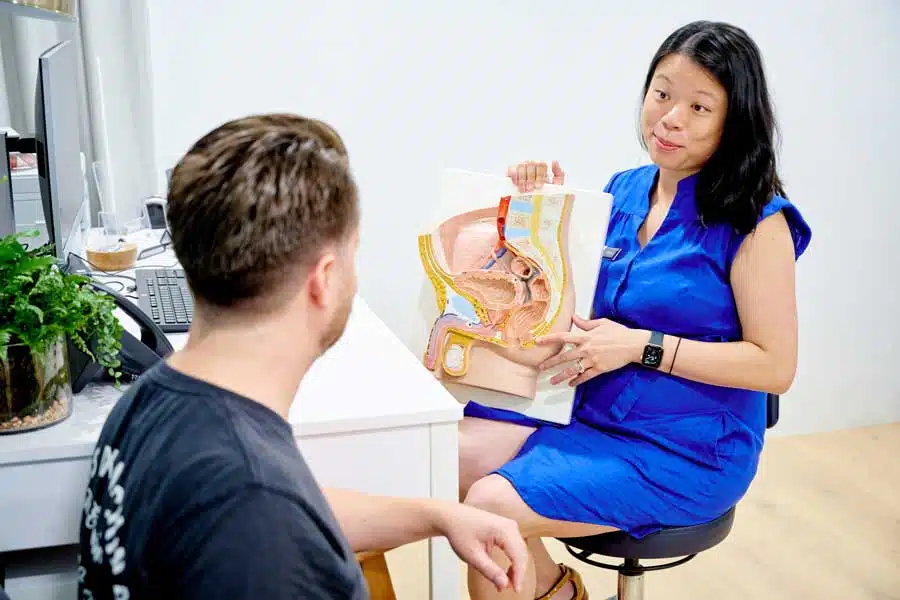Multiple Sclerosis: How Pelvic Physio Improves Quality of Life Outcomes Through Bladder and Bowel Support
What Are Incontinence Issues?
Before we dive into the thick of it, let’s make sure we have a full understanding of what incontinence is and why it can impact people diagnosed with MS.
Incontinence is the accidental leakage of urine, feaces, or flatulence. There are many types of incontinence, with different mechanisms responsible. However, there is usually a lack of control of muscles and/or nerves that control urination and defecation, aka the bladder and bowels, located in the pelvic region.
A person living with MS is dealing with nerve damage, impacting the signals sent between the brain and body. In many cases, this nerve damage combined with a loss of muscle strength can translate to a lack of functional ability in the bladder or sphincter, causing incontinence.
The Effects of Bladder and Bowel Incontinence on Daily Life
Incontinence is nothing to be ashamed of, with over 5 million Australians experiencing some kind of bowel or bladder control issue in their lifetime. Yet, many of those who deal with incontinence will find themselves suffering in silence, embarrassed to seek treatment for their symptoms.
There are plenty of ways these symptoms can limit patients from participating in normal everyday activities, impacting their quality of life. In many cases, those dealing with incontinence will withdraw from social settings, for fear of an accident in public. Grandparents might pull back from playing with grandkids, for fear of an accident. Or wearing safeguard items to avoid accidents, like adult nappies, can lead to a lack of confidence and feelings of shame.
If you have found yourself living with incontinence, don’t let it stop you from living your life. Shame often prevents patients from seeking help from medical practitioners, not realising that these symptoms are treatable. Don’t delay in reaching out for help from a physical therapist – it is an amazing first step toward treatment and recovery.
How Pelvic Physio Helps Incontinence in MS Patients
Pelvic physiotherapy is a wonderful tool for addressing any kind of incontinence, for any kind of patient, including those living with MS. It is one of the most proven therapies for addressing incontinence, using different therapies and exercises to rehabilitate the pelvic floor and regain proper function.
Recent studies have shown that pelvic floor muscle training, a form of physical therapy, has been proven to significantly reduce urinary incontinence in people living with MS. How does it do this? While the therapy used can vary, the goal of physical therapy is to improve overall strength and control over the pelvic region. In doing so, patients can gain better control over those muscles, reducing bowel/bladder leakage issues.
Physio Treatments for Multiple Sclerosis
Sydney Pelvic Clinic has numerous treatment options available for MS patients looking to treat incontinence issues. Typical physiotherapy treatment options to address incontinence include:
Bladder Training
Bladder training comprises different tools to help patients better understand their incontinence. This includes keeping a bladder diary to track fluid intake and urine output, to better assess the issue.
Once enough data is captured, your physiotherapist can work on treatment exercises to engage in, such as pelvic floor muscle exercises, and diet and lifestyle changes.
Pelvic Exercises
One of the best ways to treat incontinence is to increase a patient’s control over their pelvic region, particularly the pelvic floor. Exercises that stimulate and build strength in the pelvic region, such as Kegels, can be effective in building up better control to reduce leakage issues.
Evidence-Based Technologies
There are also new, evidence-based technologies out there doing wonders to help patients deal with incontinence. Here at Sydney Pelvic Clinic, we utilise one such tool called the Esmella Chair, a breakthrough treatment that can effortlessly strengthen a patient’s pelvic floor.
The Esmella Chair works to stimulate the pelvic floor muscles, using non-invasive electromagnetic impulses to trigger contractions that build muscle strength. You can click here to learn more about this fascinating new tech that’s helping patients beat incontinence symptoms.
The femfit® is also an option for female MS sufferers. A brand new pelvic floor training device – and Sydney Pelvic Clinic are the first in Australia to have access to this revolutionary technology! Discover a healthier, stronger pelvic floor, and resolve urinary incontinence symptoms with femfit®.
Pelvic Physio: Improving Your Quality of Life
Those dealing with bowel and bladder issues don’t need to suffer in silence anymore. Gone are the days of living in secrecy and shame, embarrassed to admit to the ways incontinence impacts our everyday life. Instead, we want you to feel empowered, knowing that you’re not alone with your symptoms and that there are things that can be done to address them.
Physiotherapy treatment has proven results when it comes to improving the quality of life for patients dealing with incontinence. In many cases, physical therapy can do wonders to not only reduce symptoms but allow patients to return to living symptom-free.
Patients with MS who are dealing with incontinence can find hope in the ways physiotherapy can address the condition. If you’re looking for more information on incontinence and MS or would like to book a consultation, please click here to contact our team today! We’re ready and qualified to help you with your incontinence, using the best patient care practices and the latest technologies to improve your quality of life.

